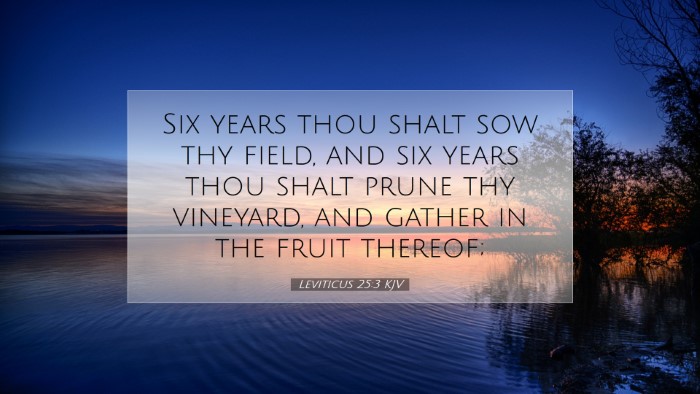Commentary on Leviticus 25:3
Verse Reference: Leviticus 25:3 states, "Six years you shall sow your field, and six years you shall prune your vineyard, and gather in its produce."
Introduction
This verse initiates a significant concept in the biblical economic and social structure - the sabbatical year. Understanding this passage is vital for pastors, students, and theologians as it reflects broader themes of rest, stewardship, and divine order.
The Concept of the Sabbath Year
The principle of rest in the Old Testament is foundational. Just as God rested on the seventh day after His work of creation, He ordained a cycle of rest for His people. Leviticus 25:3 introduces the agricultural rhythm commanded by God, demonstrating His concern for creation and the well-being of His people.
Historical Context
In ancient Israel, the agricultural economy heavily relied on the cyclical seasons. The command to cease sowing and pruning every seventh year was revolutionary, emphasizing reliance on God’s provision. Henry notes that this regulation was to showcase faith and trust among the Israelites.
Matthew Henry's Insights
In his commentary, Matthew Henry highlights the spiritual implications of this sabbatical observance. He articulates that the land ‘keeping a sabbath’ signifies a divine ordinance that not only benefited the earth but enhanced the moral consciousness of the people. He posits that this commandment was both a test of faith and a means of acknowledging God's ultimate lordship over the earth.
Albert Barnes' Reflections
Albert Barnes explores the practical implications of the command, asserting that allowing the land to rest prevents exploitation and maintains its fertility. Instead of a purely economic decision, Barnes describes this commandment as a profound spiritual principle, showing that God's people should remain dedicated to maintaining a sustainable relationship with creation.
Adam Clarke's Analysis
Adam Clarke adds depth by considering the broader societal implications. He indicates that the practice of allowing land to lie fallow every seventh year also promoted social justice, as the poor would have access to the produce that arose spontaneously in this year of rest. Clarke emphasizes that this approach to economics nurtures community welfare and solidarity, echoing the heart of God’s concern for the marginalized.
Theological Significance
The staggered cycle of work and rest encapsulated in Leviticus 25:3 serves as a profound theological symbol. It advocates a rhythm that upholds not just agricultural practices, but also spiritual disciplines within the community of believers.
The Principles of Stewardship
- Dependence on God: Observing the Sabbath year illustrates a deep reliance on God’s provision, teaching the Israelites to trust in His faithfulness.
- Environmental Integrity: By allowing the land to rest, the people of Israel honored God’s design for sustainability, serving as an early model of ecological stewardship.
- Social Justice: The provision for the poor during the fallow year reflects God’s heart for the disenfranchised, making the command not just an agricultural guideline, but a socio-economic framework.
Practical Application for Today
Understanding Leviticus 25:3 is essential for modern believers. It prompts several reflections:
- Embracing Rest: In a fast-paced society, this verse calls for a rhythm of work and rest, prompting individuals to prioritize spiritual renewal.
- Promoting Justice: The principles illustrated in this command compel Christians to consider their own practices regarding wealth distribution and assistance to the needy.
- Environmental Responsibility: The command highlights the importance of caring for God’s creation, urging believers to engage in sustainable practices as stewards of the earth.
Conclusion
Leviticus 25:3 serves as a foundational directive for the people of Israel, emphasizing rest, renewal, and reliance on God's provision. The insights of Matthew Henry, Albert Barnes, and Adam Clarke converge to reveal the multifaceted significance of this verse within its historical context and its lasting theological implications. For pastors, students, and theologians alike, this scripture encourages reflection on the rhythm of life ordained by God, calling for restoration not only in personal lives but collectively within communities. It ultimately reaffirms the principle that while humans are to labor, they must also honor God by trusting in His care and provision through rest.


